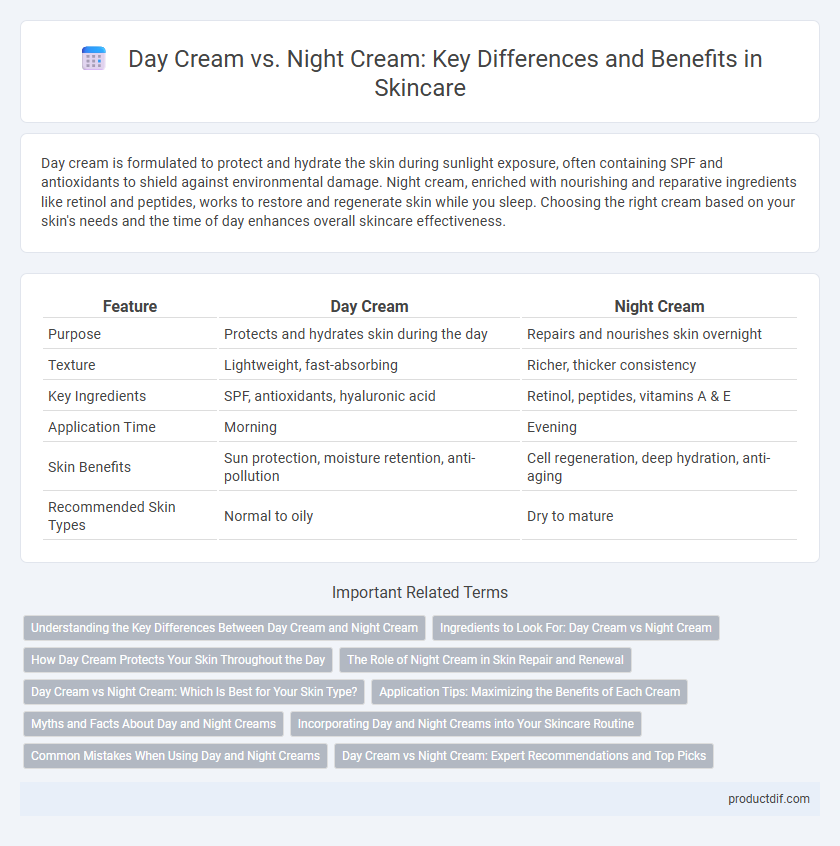Day cream is formulated to protect and hydrate the skin during sunlight exposure, often containing SPF and antioxidants to shield against environmental damage. Night cream, enriched with nourishing and reparative ingredients like retinol and peptides, works to restore and regenerate skin while you sleep. Choosing the right cream based on your skin's needs and the time of day enhances overall skincare effectiveness.
Table of Comparison
| Feature | Day Cream | Night Cream |
|---|---|---|
| Purpose | Protects and hydrates skin during the day | Repairs and nourishes skin overnight |
| Texture | Lightweight, fast-absorbing | Richer, thicker consistency |
| Key Ingredients | SPF, antioxidants, hyaluronic acid | Retinol, peptides, vitamins A & E |
| Application Time | Morning | Evening |
| Skin Benefits | Sun protection, moisture retention, anti-pollution | Cell regeneration, deep hydration, anti-aging |
| Recommended Skin Types | Normal to oily | Dry to mature |
Understanding the Key Differences Between Day Cream and Night Cream
Day cream is formulated with lighter textures and SPF to protect and hydrate skin during sun exposure, while night cream contains richer, more concentrated ingredients designed to nourish and repair skin overnight. Key differences include the presence of antioxidants and UV blockers in day creams versus reparative ingredients like retinol and peptides in night creams. Understanding these distinctions helps optimize skincare routines for enhanced hydration, protection, and skin regeneration.
Ingredients to Look For: Day Cream vs Night Cream
Day creams typically contain antioxidants like vitamin C, SPF for sun protection, and lightweight moisturizers such as hyaluronic acid to hydrate and shield skin from environmental damage. Night creams often feature richer ingredients like retinol, peptides, and ceramides that promote skin repair, collagen production, and deep hydration during sleep. Both formulas should be chosen based on skin type and targeted concerns for maximum efficacy.
How Day Cream Protects Your Skin Throughout the Day
Day cream contains SPF and antioxidants that shield your skin from UV rays and environmental pollutants, preventing premature aging and sun damage. Its lightweight, hydrating formula provides essential moisture, maintaining skin's barrier function and preventing dryness during daily exposure. Ingredients like niacinamide and hyaluronic acid support skin resilience, ensuring long-lasting protection and a healthy complexion throughout the day.
The Role of Night Cream in Skin Repair and Renewal
Night cream plays a crucial role in skin repair and renewal by providing intense hydration and delivering active ingredients like retinol, peptides, and antioxidants that promote collagen production and cell regeneration. Unlike day creams, night creams have a richer texture and formulation designed to support the skin's natural nighttime healing process, reducing signs of aging and improving texture and tone. This specialized care helps restore skin balance, repair damage, and enhance overall skin health during sleep.
Day Cream vs Night Cream: Which Is Best for Your Skin Type?
Day cream is formulated with lightweight, hydrating ingredients and SPF to protect against UV damage, making it ideal for oily or combination skin that requires sun protection and moisture balance. Night cream typically contains richer, more emollient components like retinol, peptides, and antioxidants to support skin repair and regeneration, benefiting dry or mature skin types. Choosing the best cream depends on your skin's hydration needs and sensitivity to sunlight, ensuring optimal results with a tailored skincare routine.
Application Tips: Maximizing the Benefits of Each Cream
Apply day cream in the morning on thoroughly cleansed skin to provide hydration and sun protection, focusing on areas exposed to sunlight. Use night cream after cleansing and toning, gently massaging it into the face and neck to promote deep nourishment and skin repair during sleep. Consistent application of each cream at the correct time enhances their targeted benefits, improving overall skin texture and health.
Myths and Facts About Day and Night Creams
Day creams are formulated with lighter textures and higher SPF to protect skin from UV rays and environmental pollutants, while night creams typically contain richer, more intensive moisturizing ingredients and antioxidants to support skin repair during sleep. A common myth is that night creams are unnecessary if you use day cream, but factually, night creams provide crucial hydration and regeneration that day creams cannot offer. Understanding that each cream serves distinct functions based on skin's circadian rhythm optimizes skincare benefits.
Incorporating Day and Night Creams into Your Skincare Routine
Incorporating day and night creams into your skincare routine enhances skin hydration and repair by targeting different needs around the clock. Day creams typically contain SPF and antioxidants like vitamin C to protect against UV damage and environmental pollutants, while night creams are enriched with ingredients such as retinol and peptides to promote cell regeneration and collagen production during sleep. Using both ensures comprehensive skin care, maximizing protection and rejuvenation for a healthier complexion.
Common Mistakes When Using Day and Night Creams
Common mistakes when using day and night creams include applying heavy night creams in the morning, which can clog pores and cause breakouts, and neglecting to use SPF in day creams, reducing skin protection from UV damage. Many users mistakenly skip night cream altogether, undermining nighttime skin repair and hydration. To maximize benefits, choose lightweight, SPF-infused day creams and richer, nourishing night formulas tailored to skin type.
Day Cream vs Night Cream: Expert Recommendations and Top Picks
Day cream formulations emphasize lightweight hydration and broad-spectrum SPF protection to shield skin from UV damage and environmental pollutants during daylight hours. Night creams are richer, containing higher concentrations of active ingredients like retinol, peptides, and antioxidants to support skin repair, collagen production, and hydration overnight. Dermatologists recommend selecting day creams with SPF 30 or higher and night creams with nourishing, restorative ingredients tailored to individual skin concerns for optimal results.
Day Cream vs Night Cream Infographic

 productdif.com
productdif.com